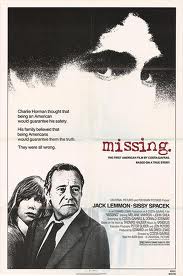★ ★ ★ ★ 1/2
Missing is a 1982 film by Greek writer/director Costa-Gavras. Like many Costa-Gavras films (Best Foreign Film Winner Z, State of Seige, Music Box), it blends strong political overtones with an interesting and exciting story. In some films it is difficult for this blend to work without getting preachy or heavy handed, but in Missing, it works beautifully.
The film is based on the true life events surrounding the 1973 coup d’états by General Augusto Pinochet (though the film never actually mentions his name). Charles Horman (John Shea) is a freelance American journalist temporarily residing in Chile with his wife, Beth, before the coup. His work in Chile, outside of personal projects, was for a liberal leaning newspaper and, in addition, Horman kept extensive notes on the situation involving both Chilean and American involvement in political matters. While on a short trip to Vina del Mar with a friend from America who is visiting, Terry (Melanie Mayron), Horman hears of the coup that is rising in Santiago. He rushes to get back to his wife and, on the way home, notices the military brigades, strict curfew laws and dictatorial rule that is taking over the city. Once home, Beth wants to leave the country immediately; however, all air transportation has been suspended.
In the days following, Beth and Charles get separated from each other. When Beth comes back to her hoouse in Santiago, she finds it in shambles and can’t find Charles anywhere. Charles father, Ed Horman (Jack Lemmon), come to Santiago to help find his son who, by the time he arrives, hasn’t been heard from in over two weeks. The rest of the film deals with the search for Charles by both Ed and Beth. Ed, a Christian Science conservative, seems to have never really had a deep relationship with his son over their opposing views. Yet, in the search, it shows how deeply he loved his son and how he wants justice. Whether they find Charles or not, I will leave open so that it won’t spoil the ending of the film.
The story and direction by Costa-Gavras is top notch. His ability to make an entertaining film out of such politically infused material is amazing. The pacing, the shot composition and overal mood for the film is perfect for this story. Jack Lemmon, what can you say? This is a man who no matter what role he takes, shines and brings something special to a performance. I’ve seen many Jack Lemmon films and never once have I seen one where he didn’t amaze me with his abilities as an actor; this film is no different. His restrained emotion and no-nonsense attitude towards the whole situation, but deep underlying hurt for the disappearance of his son, is so nuanced and perfect for this role that it is hard to see anyone else playing the part. The rest of the cast works for their roles; however, Sissy Spacek felt a little out of place to me in this film (though she was nominated for a Best Actress Oscar for her role). Other Academy Award nominations included Lemmon for Best Actor in a Leading Role, Best Picture and Best Adapted Screenplay for Costa-Gavras and Donald Stewart. Stewart and Costa-Gavras would take home the award for their screenplay.
This is an eye opening film that draws you in on almost every level. I had never heard about the coup in Chile, so for me, I was quite interested to continue research on the events that took place after watching the film. As a filmmaker, what more can you ask? A satisfied, entertained viewer that wants to continue to learn about the topics surrounding the true story you’ve depicted.


Leave a comment